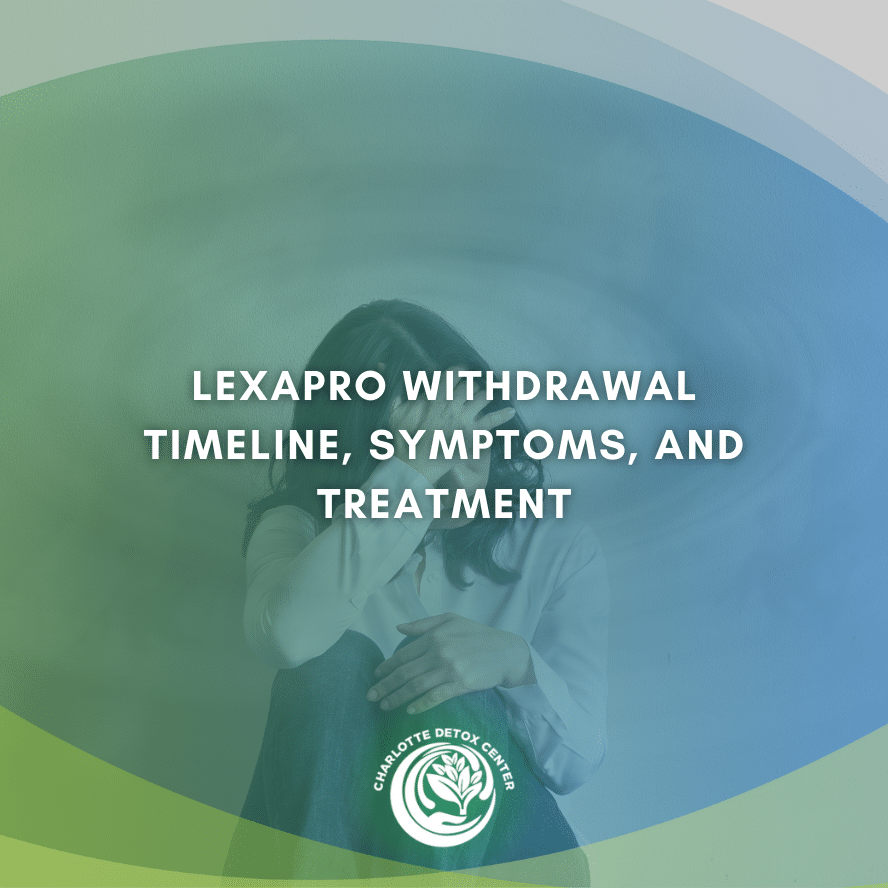Lexapro Withdrawal Timeline, Symptoms, and Treatment

Medically Verified: 2/1/24
Medical Reviewer
Chief Editor

All of the information on this page has been reviewed and verified by a certified addiction professional.
Lexapro is the brand name for escitalopram, a selective serotonin reuptake inhibitor (SSRI) antidepressant medication that is used to treat major depressive disorder (MDD) and generalized anxiety disorder (GAD). It is also used off-label in the treatment of obsessive-compulsive disorder (OCD), eating disorders, post-traumatic stress disorder (PTSD), and premenstrual dysphoric disorder (PMDD).[1] Because of its wide variety of uses, Lexapro is one of the most popular and widely prescribed antidepressants in the United States.
Lexapro (escitalopram) is a very useful, effective, and safe medication. However, people should never stop taking it suddenly–even if they feel better. Like other SSRIs, abruptly stopping Lexapro can cause a variety of uncomfortable withdrawal symptoms. The Lexapro withdrawal timeline varies from one person to the next, but many people experience symptoms for at least three weeks after taking their last dose.
Symptoms of Lexapro (Escitalopram) Withdrawal
Nearly 56% of people who stop taking an SSRI experience symptoms of withdrawal.[2] This is because stopping the medication suddenly affects serotonin levels in the brain, resulting in unpleasant symptoms.
Doctors and other medical professionals refer to these withdrawal symptoms as antidepressant discontinuation syndrome, but the effects can still be severe.
Common symptoms of Lexapro withdrawal include:
- Irritability
- Agitation
- Dizziness
- Nausea
- Vomiting
- Insomnia
- Nightmares
- Headache
- Prickling sensation on the skin
- “Brain zaps” or the sensation of having electrical jolts in the brain
These symptoms occur in the first few weeks after stopping the medication. However, a second phase of withdrawal symptoms may occur three or more weeks after the last dose. Symptoms that may arise late include:
- Anxiety
- Depression
- Mania
- Mood disturbances
- Impaired memory
- Impaired coordination
- Irritability
- Insomnia
- Mood swings
- Stress
If experienced, these symptoms will subside over the next few weeks or months.
How Long Does Lexapro Withdrawal Last?
Lexapro has a long half-life of about 27 to 32 hours.[3] That means the medication stays in the body for a long time and is metabolized very slowly. As a result, it can take a few days before symptoms begin and symptoms can last for several weeks.
Lexapro Withdrawal Timeline
The length of the Lexapro withdrawal timeline varies from one person to the next depending on factors such as:
- How long the medication was taken
- What dosage was taken
- Age, weight, and gender
- Co-occurring mental health conditions
Some people who stop taking Lexapro don’t experience any withdrawal symptoms at all. Others only experience one or two symptoms.
Because there are so many influential factors, it is difficult to estimate the exact withdrawal timeline. However, most people begin having symptoms 2-3 days after stopping the medication, and their symptoms peak between days 4 and 6. Most people stop having symptoms after three weeks, but others experience long-lasting and lingering symptoms that fluctuate over time.
Discontinuing Lexapro Safely
The best way to stop taking Lexapro is to avoid quitting cold turkey. In other words, don’t stop taking the medication all at once. Doing so can increase the risk of severe withdrawal symptoms. Instead, individuals should consult with the doctor who prescribed the medications to discuss the reasons for quitting the medication as well as a quitting plan.
If the physician believes it is a good idea to stop the medication, he or she will likely suggest a tapering schedule. Tapering involves slowly weaning a person off of medication by gradually reducing their dose over the course of several weeks or months. By slowly reducing the dose, individuals can avoid the most severe symptoms of withdrawal.
The latest research has found that the best way to stop taking SSRIs is using a very slow, long taper. Most SSRI tapers last more than one month.[4]
Coping With Antidepressant Discontinuation Syndrome
Practicing self-care can help people cope with the Lexapro withdrawal timeline. Ways to practice self-care include:
- Eat a balanced, nutritious diet
- Follow a regular sleep schedule
- Get regular exercise
- Minimize stress
- Tell friends and family about quitting Lexapro and go to them for support
The biggest risk of quitting SSRIs like Lexapro is the risk of suicidal ideation. This is most common in people under the age of 25, but it can happen to anyone. People who begin having suicidal thoughts or displaying suicidal actions should seek immediate medical care.
Find Help for Yourself or a Loved One
Stopping Lexapro without your doctor’s guidance is never a good idea. Be sure to speak with your doctor before making any changes to your medications.
Charlotte Detox Center specializes in helping people detox from drugs and alcohol and connects them with dual diagnosis rehab centers that provide comprehensive, individualized care. If you or a loved one are struggling with addiction and/or mental health, please don’t hesitate to reach out to us. Our qualified team is standing by, ready to take your call.
References:
- https://www.nami.org/About-Mental-Illness/Treatments/Mental-Health-Medications/Types-of-Medication/Escitalopram-(Lexapro)
- https://www.sciencedirect.com/science/article/pii/S0306460318308347?via%3Dihub
- https://www.health.harvard.edu/diseases-and-conditions/going-off-antidepreX/fulltext
- https://www.thelancet.com/journals/lanpsy/article/PIIS2215-0366(19)30032-X/fulltext
